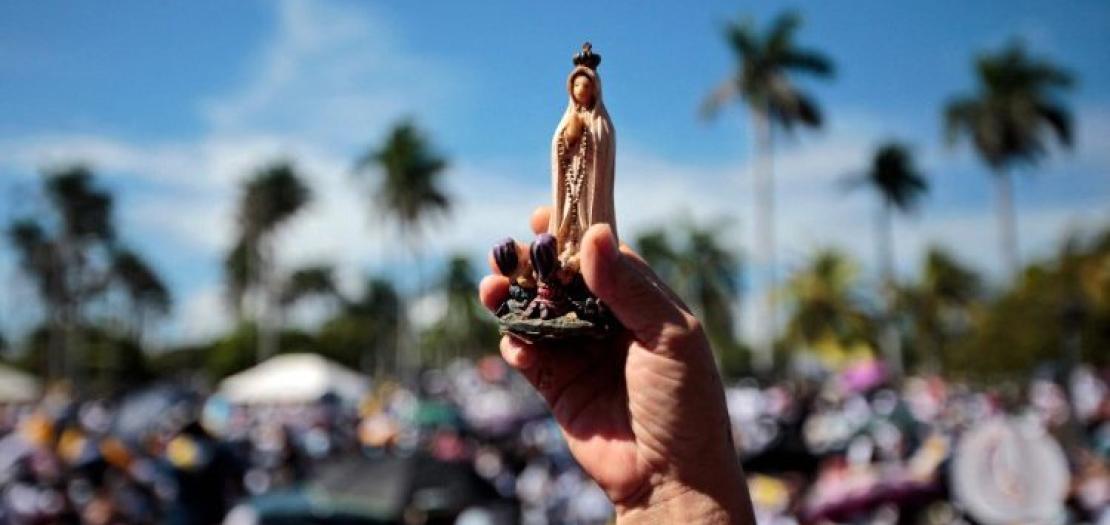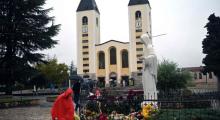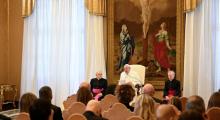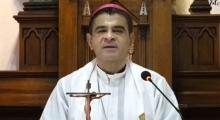Issued by the Catholic Center for Studies and Media - Jordan. Editor-in-chief Fr. Rif'at Bader - موقع أبونا abouna.org

Raising his prayer for peace, fraternity and harmony in Nicaragua on the Solemnity of the Immaculate Conception, Pope Francis asked believers to join him in asking the Mother and Patron of the country to open hearts and allow dialogue in the pursuit of peace, fraternity and harmony.
Speaking during the Sunday Angelus, the Pope expressed particular closeness to the Church and to the people of Nicaragua whom, he said, celebrate “La Purísima,“ a novena—or nine-day prayer—in honour of the Immaculate Conception of the Virgin Mary, the country’s patron saint.
“May the Heavenly Mother be their consolation in difficulties and uncertainties and open the hearts of all, so that a path of respectful and constructive dialogue is always sought to promote peace, fraternity, and harmony in the country,” he said.
“May the Heavenly Mother open the hearts of all so that a path of respectful and constructive dialogue is always sought.”
The Pope’s concern for the Church and the people of Nicaragua comes in the wake of a series of limitations imposed by the Ortega government on faith-based organizations and the expulsion and detention of priests and bishops.
“I invite you to join me in prayer for the Church and people of Nicaragua who celebrate the Purísima, as Mother and Patroness, and lift to Her a cry of faith and hope.”
Religious sisters face government pressure to leave Nicaragua
Pressure against religious sisters in Nicaragua grows amid rumors that the remaining religious sisters in the country will be forced out of the country by the end of the year.
Officials from the Ortega regime had a meeting two months ago with the superiors of religious congregations in the country, in which they were told that residency permits would not be renewed for foreign priests and sisters once they expired, local sources told The Pillar.
“They also said that those who insisted on renewing their permits would be charged more than usual for the process and still be denied, so that they should not even bother,” a source close to the bishops’ conference told The Pillar.
Persecution against the Catholic Church in Nicaragua began during the 2018-2019 protests against the Ortega regime.
However, the dictatorship intensified the persecution two years ago, with a systematic campaign against religious congregations, starting with the expulsion of the Missionaries of Charity from the country.
A March 2022 law gives Nicaragua’s government new latitude to close civilly registered non-profits in the country and to limit the activity of foreign NGOs. The Ortega regime has used the law to expel various congregations from the country and see the country’s Catholic Charities operation dissolved.
Under this law, four Catholic universities, dozens of Catholic non-profits, and the legal entities under which many religious congregations operated were closed.
Under the law’s provisions, the assets of organizations that are voluntarily dissolved can be distributed to other organizations. But if the government dissolves an organization for any reason, its property can be seized, which has been the case for many institutions.
Many congregations have been expelled from the country under the 2022 law, including the Franciscans, Jesuits, Missionaries of the Sacred Heart, and a female Trappist community.
In some instances, some members of these institutions remain in the country, but without any legal structure to support them. For example, a small number of Jesuits remain in Nicaragua.
Other congregations have silently left the country amid pressure and persecution.
Human rights activist Martha Patricia Molina told The Pillar that she is in touch with religious sisters in the country, who told her that they have received an ultimatum from the government - they must leave the country by December.
“It doesn’t matter if they’re foreign or nationals, they must leave,” she told The Pillar.
“Many congregations started slowly leaving recently, there are not many anymore in Nicaragua; in many cases, the government is not allowing them to take their religious belongings, such as pious images, they’re being forced to do an inventory of everything they’re leaving behind,” she added.
“These religious had their non-profits canceled, and most already fled the country. Their properties will be seized,” Molina warned in a post on twitter.com
News of the renewed persecution comes days after Pope Francis published a pastoral letter to the Nicaraguan people. In it, the pope encouraged trust amid difficulty, saying “precisely in the most difficult moments, when it becomes humanly impossible to understand what God wants from us, we are called not to doubt His care and mercy.”
Since the start of the persecution against the Catholic Church, the Nicaraguan regime has forced the closure of dozens of Catholic TV and radio stations, the dissolution of the legal structures of religious congregations, Catholic universities, and Catholic foundations, and the seizure of their properties.
More than 250 clergy and religious have been forced into exile, including four bishops and almost 20 per cent of the country’s priests.
On November 12, the president of the Nicaraguan bishops’ conference, Bishop Carlos Herrera, OFM, was forced into exile after criticizing a pro-regime mayor during Sunday Mass in the Jinotega cathedral.
In recent weeks, the regime has faced criticism for forbidding priests from accessing public hospitals, not allowing them to visit people who have requested pastoral visits or the reception of the sacraments of anointing of the sick or penance.







